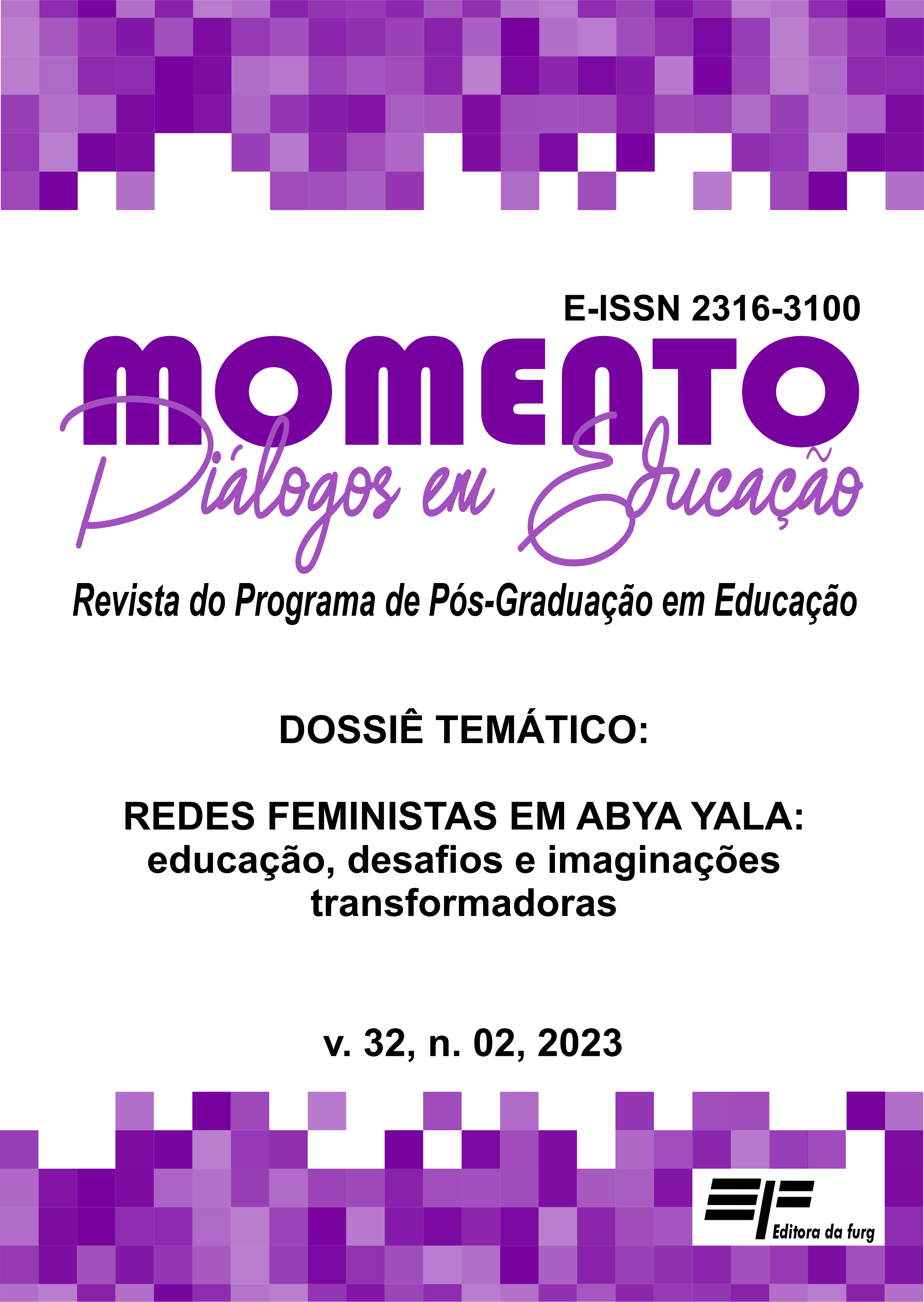WOMEN'S STRIKE IN ABYA YALA
CHALLENGES FOR TRANSFORMATIVE MOBILIZATION
DOI:
https://doi.org/10.14295/momento.v32i02.15652Keywords:
Greve de mulheres. América Latina. Redes feministas. Potência feministaAbstract
In October 2016, in Argentina, Lucía Pérez was drugged, raped, impaled and killed by three men. They left her in a hospital claiming that she had overdosed on cocaine. This feminicide took place in the same week that the National Meeting of Women in Rosario was taking place in the country. The violence of this death was the trigger to trigger a collective reaction by women. Not only in Argentina, but all over the world, there was a call for women to take to the streets. Under the motto “ni one less! Vivas y libres we want!” The strike transformed the mobilization against femicides into a massive, transnational movement, capable of connecting sexist and economic violence, denouncing capitalist exploitation. Despite this, many women around the world, and in Latin America itself, did not stop with this great movement. In Brazil, for example, months before Lucía's death, a 16-year-old girl had been raped by a group of 30 men, who recorded the violence on video. This fact did not generate significant repercussions that connected women en masse to the strike movement. In view of this, our proposal is to reflect on the challenges of the women's strike movement, which, although it has become transnational, needs to sensitize a greater number of women in order to build a network with the power capable of transforming reality.
Downloads
References
ARRUZZA, Cinzia; BATTACHARYA, Tithi; FRASER, Nancy (2019). Feminismo para os 99%: um manifesto.São Paulo: Boitempo.FRASER, Nancy (2019)
BALLESTRIN, Luciana. Feminismos Subalternos. Estudos Feministas. Florianópolis, 25(3):530, set - dez, pp. 1035 - 1054, 2017.
BARRAGÁN, Alba Margarita Aguinaga; CHÁVEZ, Dunia Mokrani; LANG, Miriam Santillana. Pensar a partir do feminismo: críticas e alternativas ao desenvolvimento. In:
BIROLI, Flávia, Gênero e desigualdades: os limites da democracia no Brasil. São Paulo:Boitempo,2018.
BURIGO, Joana. Patriarcado Gênero Feminismo. Porto Alegre: Zouk, 2022.
CAVALLERO, Luci; GAGO, Verónica. Uma leitura feminista da dívida: vivas, livres e sem dívidas nos queremos. Porto Alegra: Criação Humana, 2019.
CISNE, Mirla. Gênero, divisão sexual do trabalho e serviço social. São Paulo: Outras Expressões, 2012.
FEDERICI, Silvia. O ponto zero da revolução: trabalho doméstico, reprodução e lutaFeminista. Tradução: Coletivo Sycorax. São Paulo: Elefante, 2019.
GAGO,Verónica.A potência feminista ou o desejo de transformar tudo. Trad. De Igor Peres. São Paulo : Elefante , 2020.
GAGO, Verónica; CAVALLERO, Luci. Deuda, vivienda y trabajo: Una agenda feminista para la pospandemia. Revista Anfibia, 2020. Disponível em: https://www.revistaanfibia.com/deuda-vivienda-trabajo-una-agenda-feminista-la-pospandemia/. Acesso em 10 de junho de 2023.
GARCIA, Carla Cristina. Breve história do feminismo. São Paulo: Claridade, 2011.
HIRATA, Helena. Por quem os sinos dobram? Globalização e divisão sexual do trabalho. In. SÃO PAULO. Prefeitura Municipal Coordenadoria Especial da Mulher. Trabalho e cidadania ativa para as mulheres: desafios para as Políticas Públicas / Marli Emílio (org.), Marilane Teixeira (org.), Miriam Nobre (org.), Tatau Godinho (org.). - São Paulo: Coordenadoria Especial da Mulher, 2003. P. 15 -30.
HIRATA, Helena; ZARIFIAN, PHILIPPE. O conceito do trabalho. In. SÃO PAULO. Prefeitura Municipal Coordenadoria Especial da Mulher. Trabalho e cidadania ativa para as mulheres: desafios para as Políticas Públicas / Marli Emílio (org.), Marilane Teixeira (org.), Miriam Nobre (org.), Tatau Godinho (org.). - São Paulo: Coordenadoria Especial da Mulher, 2003. P. 65-70.
HOLLANDA, Heloisa Buarque de (org.). Pensamento feminista hoje: perspectivas decoloniais. Rio de Janeiro: Bazar do Tempo, 2020. p. 216-239.
LIMA, Lana Lage da Gama; SOUZA, Suellen André de. Patriarcado. In: Ana Maria Colling & Losandro Antonio Tedeschi (Orgs). Dicionário crítico de gênero. Dourados, MS: Ed. Universidade Federal da Grande Dourados, 2019.
NETTO, Livian Lino, EBERSOL, Isadora, & CLASEN, Julia. da Rocha. O que move a luta? A Maré Verde Argentina e a resistência das mulheres do/no Sul Global. Conjuntura Austral, 12(60), 136–147. (2021)https://doi.or g/10.22456/2178-8839.113901
VÈRGES, Françoise. Um feminismo decolonial. Trad. Jamile Pinheiro Dias e Raquel Camargo. São Paulo: UBU Editora, 2020.
Downloads
Published
How to Cite
Issue
Section
License
Copyright (c) 2023 Momento - Diálogos em Educação

This work is licensed under a Creative Commons Attribution 4.0 International License.
À Revista Momento − Diálogos em Educação, ficam reservados os direitos autorais, de todos os artigos nela publicados.


